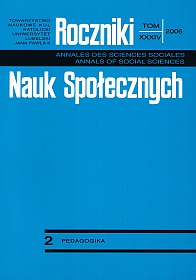Rola rodziców jako osób znaczących. Raport badawczy z zastosowaniem skali Mój ojciec i Moja matka
Abstrakt
The article contains presentation of research tools construed by the author and an analysis of material gathered with their use. The discussed tools are: Perceived Social Support Questionnaire My Mother (KPWS-M) and Perceived Social Support Questionnaire (KPWS-O) making it possible to study the intensity and range of social support obtained by young people from the closest significant others, the father and the mother. The results of the research done in a group of young people experiencing school failure and in the control group of young people who achieve school success prove that there is a statistically significant difference between the groups as far as perception of parental control, social support and „school” support on the side of the parents is concerned. The results may have important practical pedagogical implications: in work with pupils experiencing school failure one should not only revalidate or improve the pupil's performance in the cognitive sphere, but also take care of bringing back or consolidating proper relations between the pupil and significant others, first of all his parents.
Bibliografia
Baumrind D. (1991). The influence of parenting style on adolescent competence and substance use. Journal of Early Adolescence, 1, 56-95.
Conger K. J., Conger R. D., Scaramella L. V. (1997). Parents, siblings, psychological control, and adolescent adjustment. Journal of Adolescent Research 12, 1, 113-138.
Darling N., Steinberg L. (1993). Parenting style as context: An integrative model. Psychological Bulletin 113, 3, 487-496.
Domagała-Zyśk E. (2001). Rola ojców w zapobieganiu niepowodzeniom szkolnym ich dzieci, w: D. Kornas-Biela (red.) Oblicza ojcostwa. Lublin: TN KUL, 373-379.
Domagała-Zyśk E. (2004). Percepcja osób znaczących przez studentów z Polski, Niemiec i krajów Europy Wschodniej. Wystąpienie na V Ogólnopolskim Zjeździe Pedagogicznym, sekcja II. Wrocław: DSWE TWP i PTP.
Domagała-Zyśk E. (2004). Autonomia czy odłączenie? O roli osób znaczących w życiu młodzieży z trudnościami w nauce. Lublin: TN KUL.
Frey C. U., Rothlisberger C. (1996). Social support in healthy adolescents. Journal of Youth and Adolescence, 25, 1, 17-31.
Greenberger E., Chen Ch., Beam M. R. (1998). The role of „Very Important” nonparental adults in adolescent development. Journal of Youth and Adolescence, 27, 3, 321-343.
JuhaszMcCreary A. (1989). Significant others and self esteem: methods for determining who and why. Adolescence, 24, 95, 581-594.
JuhaszMcCreary A. (1989). Significant others and self esteem: methods for determining who and why. Adolescence, 24, 95, 581-594.
Kowalski W. S. (1983). Kwestionariusz stosunków między rodzicami a dziećmi A. Roe i M. Siegelmana. Podręcznik. Warszawa: COM MOIW.
Paulson S. E., Marchant G. J. (1998). Early adolescents' perceptions of patterns of parenting, teaching, and school atmosphere: Implications for achievement. Journal of Early Adolescence, 18, 1, s.5-27.
Sarason B. R., Sarason I. G., Pierce G. R. (1990). Social Support: an Interactional View. New York: Willey & Sons.
Steinberg L., Elmen J. D., Mounts N. S. (1989). Authoritative parenting, psychosocial maturity, and academic success among adolescents. Child Development 60, 1424-1436.
Steinberg L., Lamborn S. D., Dornbush S. M., Darling N., Mounts N. (1994). Over-time changes in adjustment and competence among adolescents from authoritative, authoritarian, indulgent and neglectful families. Child Development 65, 754-770.
Sullivan H. S. (1953). The interpersonal theory of psychiatry. New York: Norton.
Trent L. M. Y., Cooney G. (1996). Significant others' contribution to early adolescents perceptions of their competence. British Journal of Educational Psychology, 66, 95-107.
Villanueva M. (1996). Adolescence in middle class Lima. Haga: CIP- Gegevans Koninklijke Bibliotheek.
Weiss L. H., Schwarz J. C. (1996). The relationship between parenting types and older adolescents' personality, academic achievement, adjustment and substance use. Child Development, 67, 2101-2114.
Wentzel K. R., Caldwell K. (1997). Friendships, peer acceptance, and group membership: relations to academic achievement in middle school. Child Development, 6, 1198-1209.
Wilk J. (2002). Pedagogika rodziny. Lublin: IPKUL.
Youniss J., Smollar J. (1985). Adolescent relations with mothers, fathers, and friends. Chicago–London: The University of Chicago Press.
Copyright (c) 2006 Roczniki Nauk Społecznych

Utwór dostępny jest na licencji Creative Commons Uznanie autorstwa – Użycie niekomercyjne – Bez utworów zależnych 4.0 Międzynarodowe.


